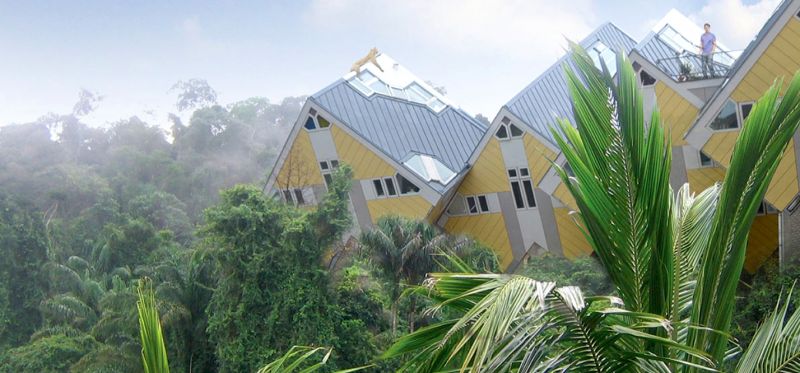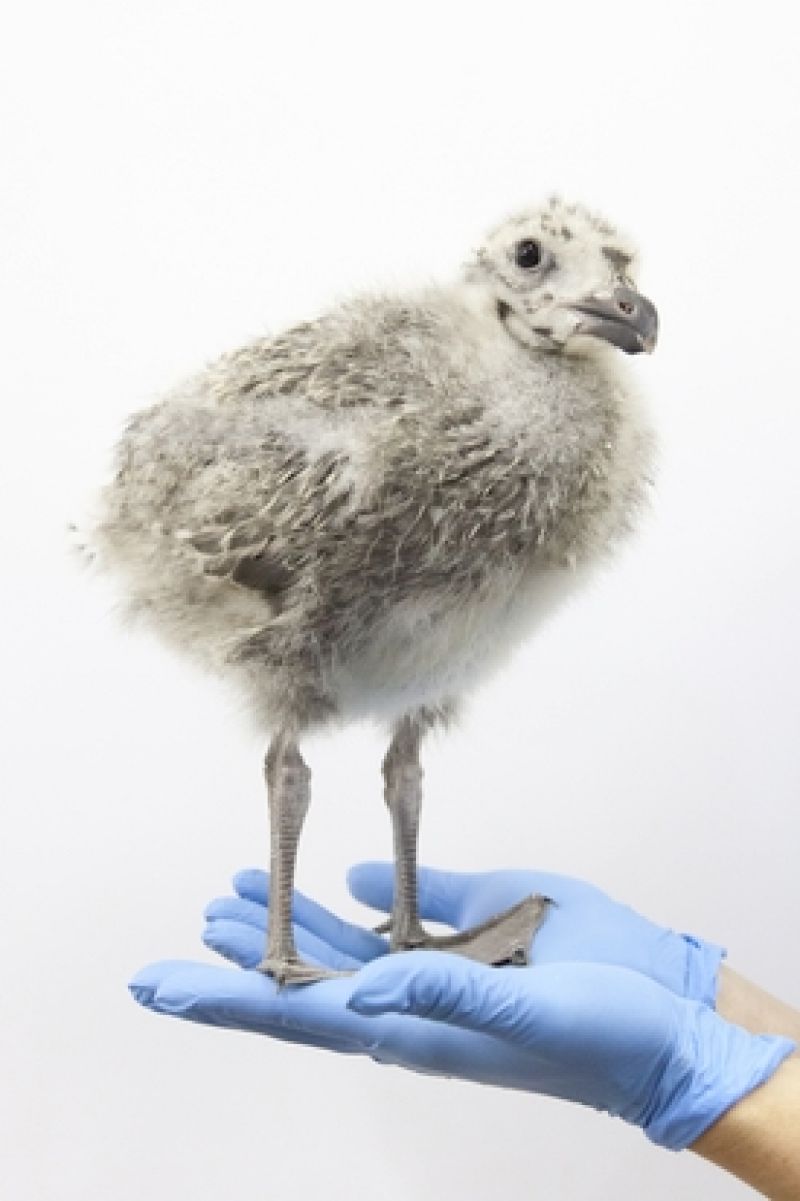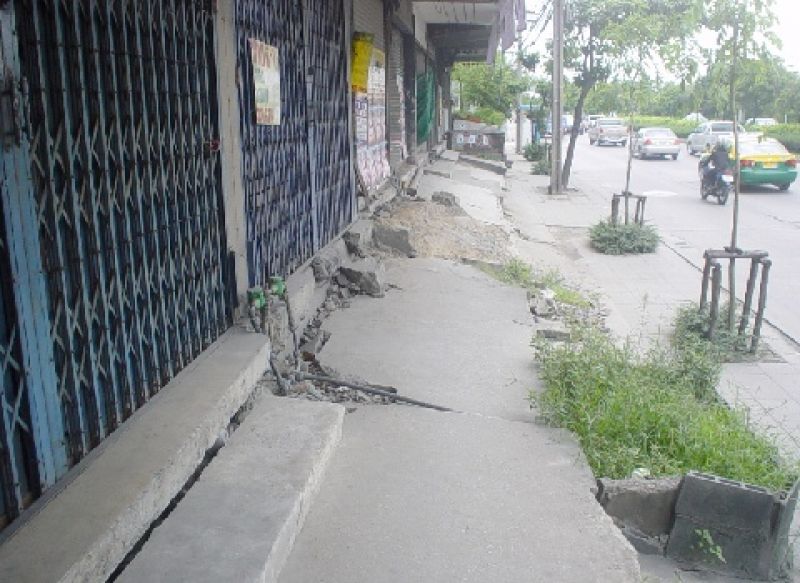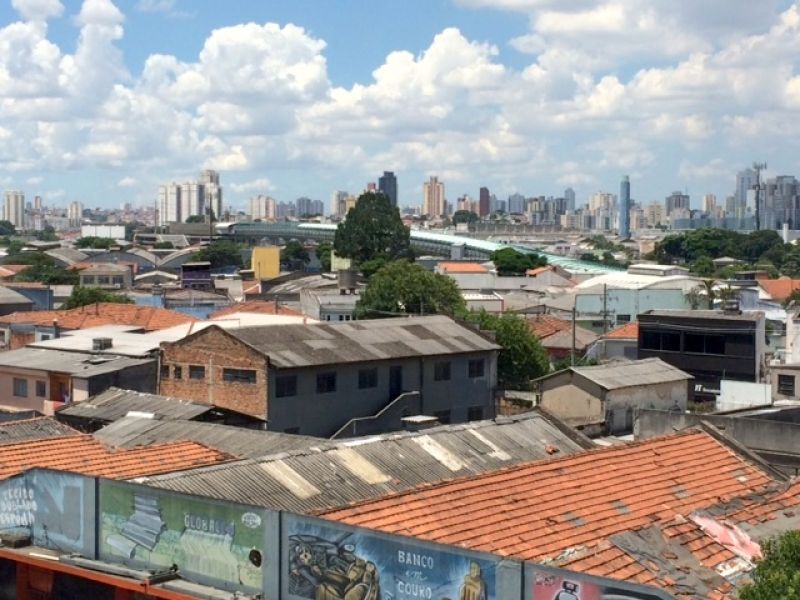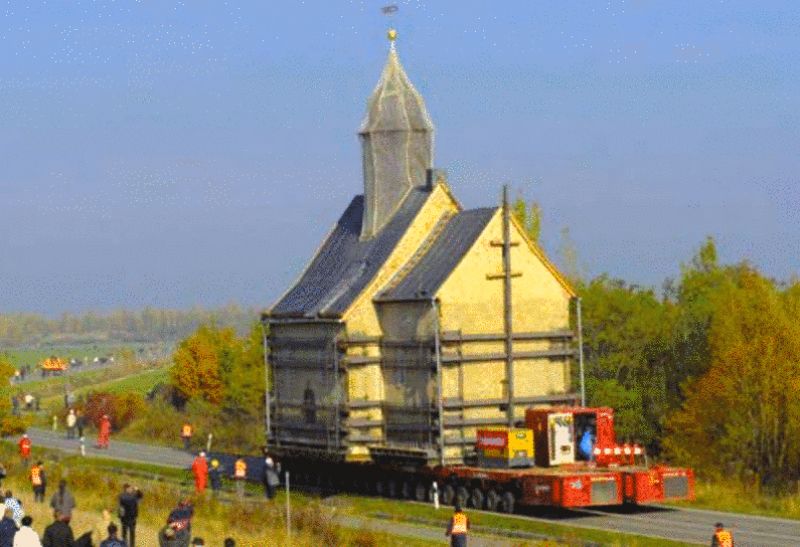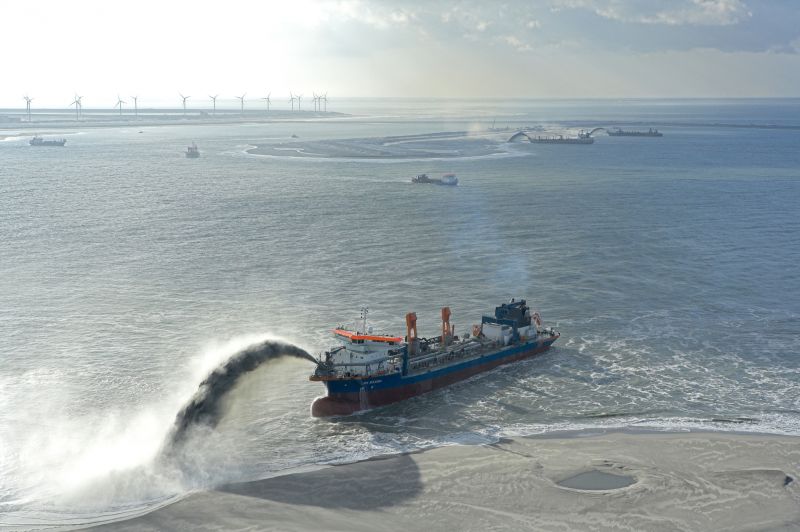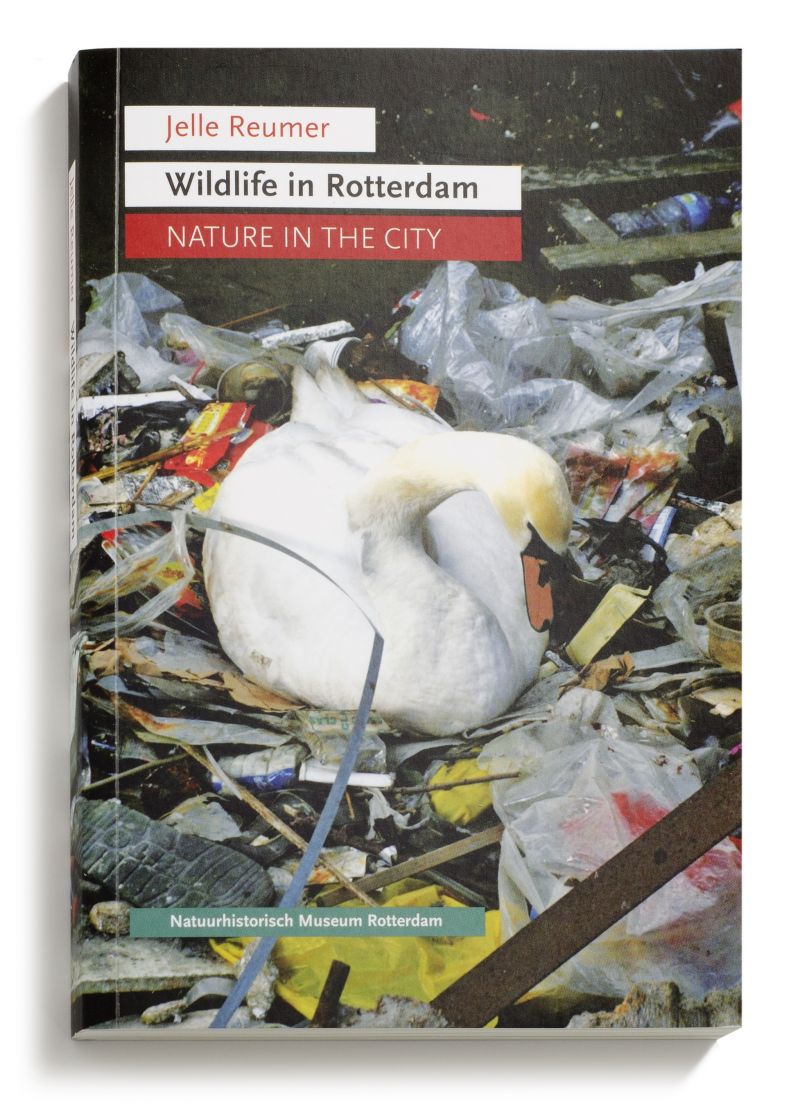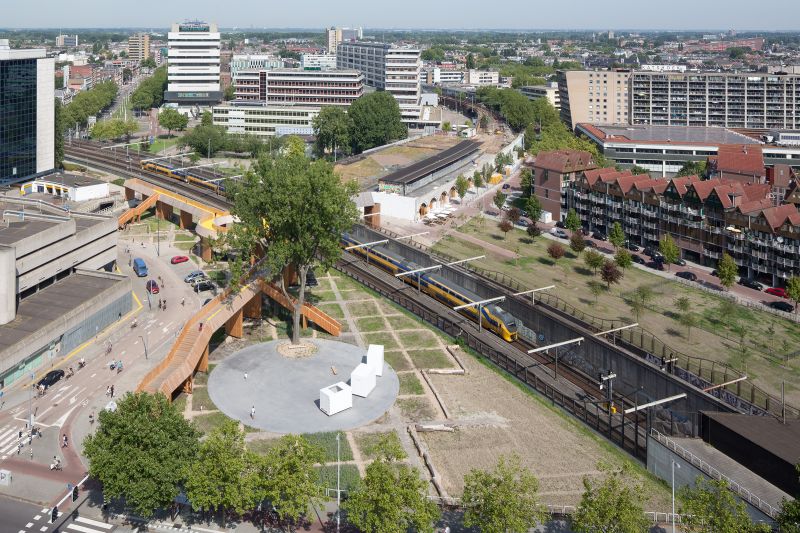IABR–2014–URBAN BY NATURE–, the sixth edition of the International Architecture Biennale Rotterdam, is open from 29 May until 24 August 2014.
The Kunsthal and the Natural History Museum Rotterdam host the main exhibition.
From 29 May until 9 July the IABR presents a comprehensive program of conferences, debates and lectures, as well as excursions and other events.
URBAN DESIGN IN TIMES OF CLIMATE CHANGE
On 29 May, the day IABR–2014–URBAN BY NATURE– opens to the public, the design and water sectors gather for the symposium Urban Design in Times of Climate Change.
Cross-sector cooperation is an essential precondition when we want to develop innovative solutions for sustainable urban development. Designers and water specialists, mainly from the United States and the Netherlands, will gather to discuss how we can take concrete steps towards the further integration of the water sector and the creative industry, and why this is essential in times of climate change.
The moderator is Henk Ovink (principal of Rebuild by Design and Senior Advisor for Secretary Shaun Donovan of HUD and the Hurricane Sandy Rebuilding Task Force)
PROGRAM:
from 9 a.m.
Coffee and croissants at Kunsthalcafé
10.00 a.m. - 12.30 p.m. symposium
The symposium will be opened by Steven L. Stockton, director of Civil Works (USACE - US Army Corps of Engineers)
In three sessions, ten projects will be presented by national and international speakers. The symposium will focus on how the Dutch integrated approach, where water knowledge and design are combined, contribute to finding solutions in times of climate change.
The program includes case studies from Jakarta, Istanbul and Rotterdam and inspiring examples of designers and stakeholders involved in Rebuild by Design, an American design competition set up after Hurricane Sandy to address the vulnerability of the New York-New Jersey region, a region that is economically essential to the USA.
Session 1
•Dawn Zimmer (Mayor Hoboken, New Jersey) / Nanco Dolman (Royal HaskoningDHV)
•Jeremy Siegel (Bjarke Ingels Group - BIG)
•Florian Boer (De Urbanisten - Rotterdam Climate Resilient City)
•Kellie Terry-Sepulveda (The Point Community Development Corporation, New York City)
Session 2
•Adriaan Geuze (West8)
•Frans van de Ven (Deltares - Dutch approach)
•David van Zelm van Eldik (Deltaprogramma Nieuwbouw & Herstructurering, Ministerie van Infrastructuur en Milieu)
Session 3
•Lodewijk van Nieuwenhuize (H+N+S – Beykoz, Turkey)
•David Waggonner (Waggonner & Ball Architects, New Orleans)
•Kristian Koreman (ZUS)
12.30 uur closing
organized by: Rebuild by Design, IABR, NWP (Netherlands Water Partnership), Ministry of Foreign Affairs and Ministry of Infrastructure and the Environment
language: English
admission is free, please register at r.melaard@nwp.nl
Meet the Rotterdam Metabolists! A joint endeavor of architects in Rotterdam who are leaders in the field of design based on the analysis of the urban metabolism. The systemic approach they share provides insights into and ideas and solutions for designing with flows, closing cycles, organic urban development, circular economy, urban agriculture and resilient sustainable development. They explore the movement that is urban metabolism along four thematic lines: reconnection with polytechnical design; transition towards socio-ecological-economical city development; the dissolving of imaginary boundaries between the local and the regional and the exploration of new value chains and business models in complex systems. The Rotterdam Metabolists explicate these lines via a talk on innovative aspects of their individual work. Host interviewer Jaap Jan Berg will talk to them and the audience on shared experiences and ways of working with the metabolism of the city.
Moderator: Jaap Jan Berg
Organized by the Rotterdam Metabolists, supported by AIR
De Rotterdamse Metabolisten are: Van Bergen Kolpa Architecten, Doepel Strijkers Architects, Except Integrated Sustainability, Paul de Graaf Ontwerp en Onderzoek, Superuse Studios, De Urbanisten en Studio Marco Vermeulen.
language: English
admission is free
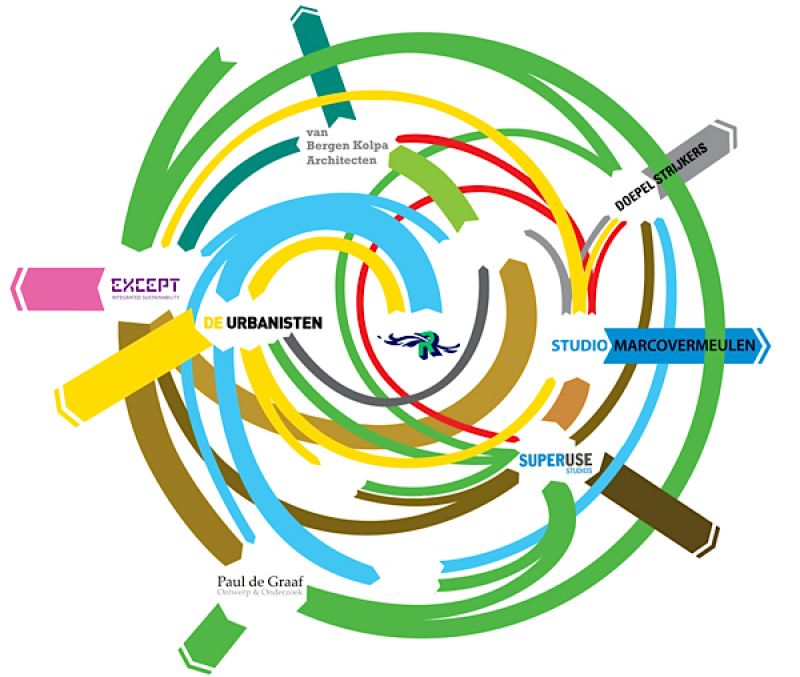
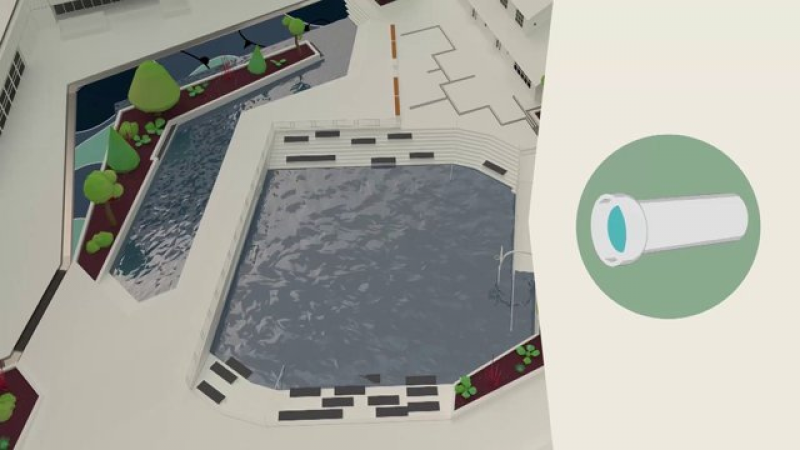
de urbanisten
animation by studio analoog
LOCAL SOLUTIONS
Inspiring examples and upbeat stories from Lagos, Can Tho and Jakarta.
Climate change, flooding, lack of infrastructure and jobs: Can such multi-facetted challenges develop into income opportunities for the urban poor? Can local construction and indigene living methods teach us innovative approaches on how to address flooding? And how do participatory methods in urban design and planning feed into this? Local Solutions provides a platform to participants in IABR–2014–URBAN BY NATURE– and other guests who are dealing with these questions and possible approaches.
Participants include Kelly Shannon, Bruno De Meulder, Daliana Suryawinata, Florian Heinzelmann, Philippe Urech, Taibat Lawanson and Fabienne Hoelzel.
Moderated by Thomas Häusler, chief science editor at SRF Radio.
language: English
admission is free
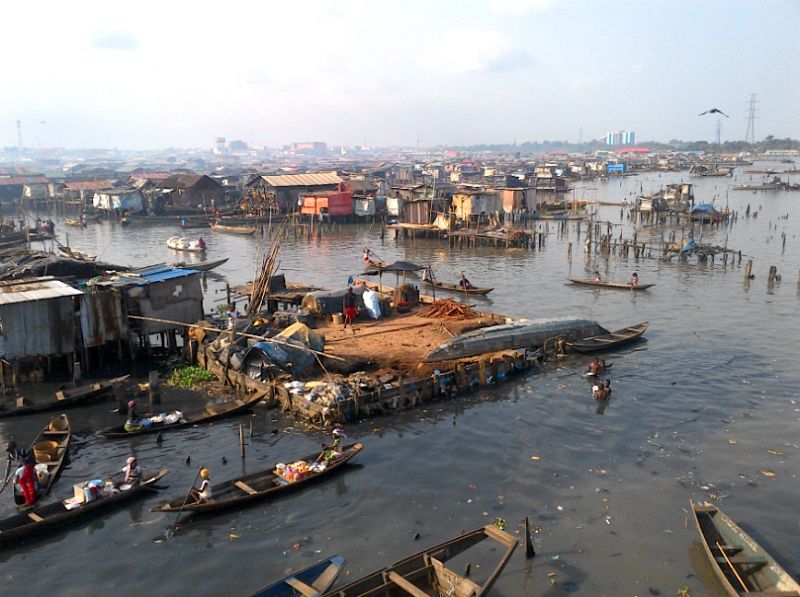
Fabulous Urban
On the occasion of the publication 'City and Wind - Climate as an Architectural Instrument' (DOM Publishers, May 2014) and the participation of the research project ´51.9 ° N - wind - city – climate´ in IABR–2014–URBAN BY NATURE–, the TU Berlin, msa Münster and the Rotterdam Academy of Architecture and Urban Design (RAvB) organize a symposium that addresses the integration of climate into the architectural and urban design process.
How can the design of neighborhoods and buildings optimize the urban climate? Experts discuss the relationship between architecture, urbanism and environment.
Speakers: Peter Mensinga (ARUP, Amsterdam), Tobias Armborst (Vassar College of Art/Interboro, New York), Duzan Doepel (Lector Sustainable Architecture / Doepel Strijkers, Rotterdam) Mareike Krautheim (Architect, Berlin/Rotterdam), Ralf Pasel (TU Berlin / pasel.künzel architects, Rotterdam), Sven Pfeiffer (FH Münster), Joachim Schultz-Granberg (FH Münster)
language: English
admission is free
You can order the publication ‘City and Wind - Climate as an Architectural Instrument’ (DOM Publishers, May 2014) here.
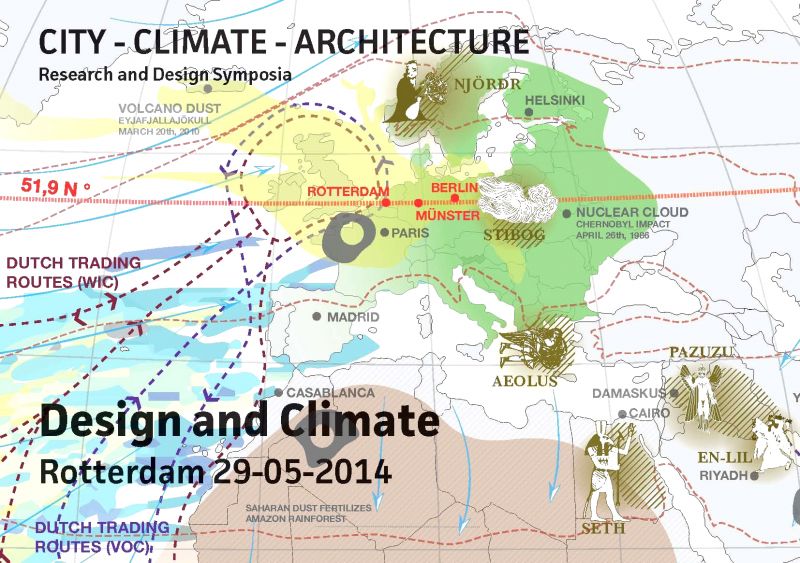
CITIES WITHOUT GROUND
Hong Kong is a city without ground. Public life here takes place on the numerous foot bridges and in underpasses, huge shopping malls, corporate lobbies, railway stations, and other nodes, rather than on the ground, in the streets, or on the sidewalks. Within the context of the ´Cities without Ground´ project, selected for the main exhibition of IABR–2014–, Adam Frampton and Jonathan Solomon discuss their guidebook to Hong Kong, ‘Cities Without Ground´, and the implications of that city's unique urbanism on the future of public space.
language: English
admission is free
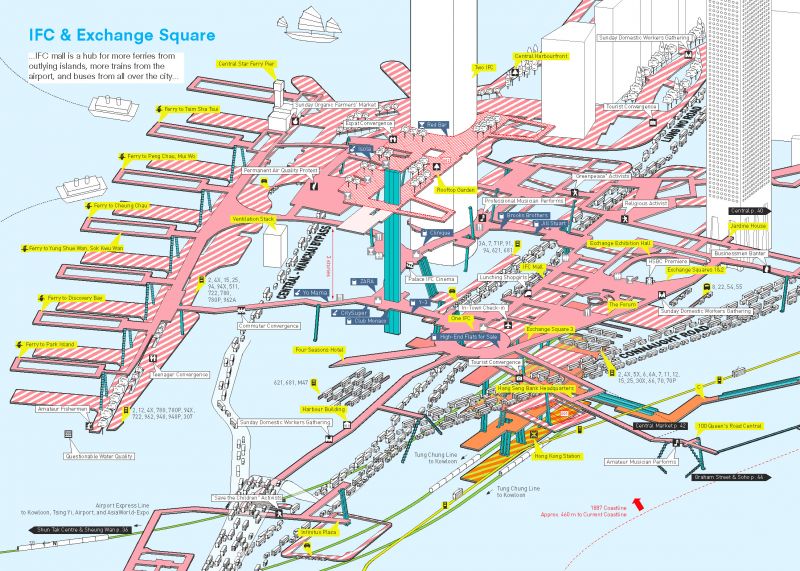
© Frampton & Solomon & Wong
ZigZagCity
Architecture Festival ZigZagCity takes place during the opening weeks of IABR–2014– and offers an alternative route across Rotterdam to encourage visitors to look at the city in a different light.
The history and transformation of the Laurenskwartier are the inspiration for a program along the route that includes interventions, performances, and spatial installations, running from Pompenburg Park to Blaakse Bos or vice versa.
All of the activities together offer a fine anthology of the development of the city of Rotterdam and the underlying architectural and social beliefs.
ZigZagCity is organized by AIR, Perplekcity and Rotterdam Archiguides.
for more information, please visit www.zigzagcity.nl
BIRDS DON'T CRY
Lecture on the occasion of the photography project ‘Birds Don’t Cry’.
Photographer Anjès Gesink and urban ecologist André de Baerdemaeker show and tell the story of birds that ran into serious trouble after having moved to the city. Having received professional help however they happily moved on with their life.
language: Dutch
for more info please visit www.hetnatuurhistorisch.nl
admission with a valid IABR–2014– entry ticket
please register via zondagmiddag@hetnatuurhistorisch.nl
MAKING MARKERMEER
The spatial policy and numerous challenges and projects with regard to the Markermeer include measures concerning water quality, flood protection, ecological value, recreational value, and major future challenges related to urbanization and the associated infrastructure. Time to discuss Making Markermeer, and explore where and how projects either impede, support, or eliminate each other and how they are likely to develop over time.
Two zones will be addressed: Marker Wadden / Houtribdijk, containing the reinforcement of Houtribdijk and the development of the Marker Wadden, and the west side of Markermeer with the lee measures Hoornse Hop and dike reinforcement Hoorn/Edam.
The presentations show the results of research by design, carried out in the context of Atelier Making Projects. The debate focuses on the various tasks of ‘Making Markermeer’ and the entire implementation.
Moderator: Bert van Meggelen
2 p.m. Introduction
by André Rijsdorp (Natuurmonumenten)
2.15 p.m. Presentations
- Recommendations Research by Design Markermeer by Frits Palmboom (Van Eesteren Leerstoel)
- Research by Design: Marker Wadden / Houtribdijk by Rik de Visser (Vista Landschapsarchitectuur & Stedenbouw)
- Research by Design: west side Markermeer by Ruut van Paridon en Karen de Groot (Van Paridon en de Groot)
3.45 pm Debate
How are cultivation of nature, water safety and recreation integrated and implemented in the projects for Markermeer? How can Markemeer be developed into a Metropolitan landscape?
5 - 6 p.m. Drinks
Organized by: Atelier Making Projects, Natuurmonumenten, the Ministry of Infrastructure and the Environment, and the Ministry of Economic Affairs
language: Dutch
free admission, please sign up via ateliermakingprojects@minienm.nl
For more information please visit: Ministerie van Infrastructuur en Milieu
THE SUSTAINABILITY OF DELTA CITIES
Delta cities struggle with long-term problems such as land subsidence, the effects of climate change, and rapidly growing populations. Jakarta, New Orleans, or Gouda: they all face major challenges.
This debate, hosted by Deltares, addresses ways to optimize the available knowledge of land subsidence, climate change, and adaptive delta management in urban planning and urban policy to create future-proof cities.
language: Dutch
for more info please visit www.deltares.nl
free admission, please sign up via iabr@deltares.nl
AWARD CEREMONY ‘DESIGNING WITH FLOWS’
On the occasion of IABR–2014–URBAN BY NATURE–, the associations BNA, NVTL and BNSP and the City of Rotterdam organized the competition: ‘The City as an Ecosystem: Designing with Flows.’ The challenge was to make the area Blaak/Westblaak more attractive, sustainable and future-proof.
From among the submitted design ideas, a jury chaired by IABR–2014–Curator Dirk Sijmons selected three nominees. The cash prize will be awarded on 4 June. The winning design will become part of the exhibition URBAN BY NATURE–.
Speakers will include Dirk Sijmons, Paul de Ruiter, Astrid Sanson, and Jos Gadet.
The nominees are:
Weaving Flows: Towards an Adaptive City
Ingrid Ackermans, Guido Zeck, and Peter Twisk
Coop Blaak
Hannah Frederick, Mischa Woutersen, Albertine Tjeenk Willink, and Rob Brink
GFT Avenue, Vegetable and Fruit Gardens in the Center of Rotterdam
Janneska Spoelman, Merten Nefs, and Lucia Dossin
organized by: BNA Research, NVTL and BNSP
language: Dutch
for more information, please visit www.ontwerpenmetstromen.nl
free admission, please sign up via secretariaat@nvtl.nl
The infrastructure of the Smart City
What are Smart Cities in the Netherlands going to look like? How are they going to affect infrastructure, the urban metabolism, and the people living in them? In the context of the IABR–2014–, Maarten Hajer (Netherlands Environmental Assessment Agency) will discuss these and related issues with Marleen Stikker (Waag Society), Jan Hendrik Dronkers (Rijkswaterstaat), Peter Glas (Water Board Association), Guido Braam (Circle Economy), Chris Sigaloff (Nederland Kennisland), and Jorick Beijer (Blossity).
language: Dutch
free admission, please sign up via www.pbl.nl/iabr
for more info, please visit the PBL's website
Annual commemoration of the wild duck that flew to his untimely death against the glass façade of the new building of the Natural History Museum on 5 June 1995, and was subsequently sexually assaulted by a same-sex congener. The now stuffed duck will make an appearance at 5:55 p.m., the exact time of the fatal accident, and interested parties and specialists will exchange ideas on methods to prevent collisions between birds and glass buildings.
Afterwards, there is a six-course duck dinner at Tai Wu, Mauritsweg 24-26, Rotterdam.
language: Dutch/English
free admission, dinner at own expense
for more information, please visit www.hetnatuurhistorisch.nl
WORKING ON THE SUSTAINABLE CITY
Cities compete about which is the most sustainable and green, but being sustainable and green real time is not that easy. What effect do all of the sustainability ambitions have on urban management today and in the future? How can we connect insights, knowledge, creativity, entrepreneurship, and investments? What part will spatial design have to play?
Organized by: Ruimtevolk and Nederlandwordtanders
language: Dutch
free admission, please sign up via www.ruimtevolk.nl
Jonathan Loh: THE HUMAN PLANET REPORT
Biocultural Diversity – Threatened species, endangered languages
Presentation by Jonathan Loh. His report describes and compares current trends in biological and linguistic diversity, and argues that there are striking parallels between the evolutionary origins of diversity of nature and of culture, with both facing an extinction crisis. However, the extinction processes in languages and in species differ and geographic patterns of extinction risks across the world differ as well.
Jonathan Loh is a biologist, a consultant to the World Wide Fund for Nature and an honorary research associate at the Zoological Society of London.
language: English
free admission, no registration required
Can design help us find an alternative model of urban development, one that does not capitalize on the exploitation of land and natural resources, but on the productive capacity of people and space?
for more information please continue reading here
language: English
free entrance, registration via conference@iabr.nl
YOURTOPIA
Discussion with Bjarne Mastenbroek (SeARCH), Sami Rintala (Rintala Eggertsson Architects) and Iwan Baan (photographer)
What is the minimum needed to achieve a maximum quality of life? Architect Bjarne Mastenbroek went back to this fundamental question in his design for The New Pavilion 2014 - Yourtopia by SeARCH. During this special evening, Mastenbroek will unfold his vision for the pavilion. On invitation by Mastenbroek photographer Iwan Baan and Finnish architect and artist Sami Rintala will reflect on his position from their own perspective.
PRACTICAL INFORMATION
Date: 12 June 2014
Time: 8.00 pm
Location: The New Pavilion, Museumpark 25, 3015 CB Rotterdam
Language: English
Admission: € 7,50/ Students € 3,75
Tickets
LAB@IABR
The Los Angeles Biennale (LAB) is an experiment in creating a nomadic platform on urbanism and architecture in LA, hosted by other urbanist biennales around the world. Its second installment takes place in Rotterdam, is hosted by IABR and ZUS, and will take place on Friday 13 and Saturday 14 June, on the Luchtsingel in the Schieblock Rotterdam.
LAB@IABR will host a number of architects, urban designers, writers, curators and others in a public setting.
Among the guests invited are Elma van Boxel (ZUS), Dirk van Peijpe (De Urbanisten), George Brugmans (director IABR), Guilherme Wisnik (curator Architecture Biennale of São Paulo), Jose Armenio de Brito Cruz (president of the Brazilian Institute of Architects), Dirk Sijmons (curator IABR–2014–URBAN BY NATURE), Joachim Declerck (Architecture Workroom Brussels), Ilaria Mazzoleni (Professor at Southern California Institute of Architecture), Anthony Carfello (LA Biennale), Adelina Greca (director National Planning Agency of Albania), Joni Baboçi (National Planning Agency Albania), and Ole Bouman (curator).
This time around, LAB will shine the light on a local municipality in Los Angeles County, Vernon City. Known for being “Exclusively Industrial” since its establishment in 1900’s, Vernon City has been home to countless factories involved in food production, storage and distribution.
“The Vernon City Project” has also been a selected entry for IABR–2014–’s main exhibition URBAN BY NATURE– in the Kunsthal Rotterdam.
Discussions will start from the possible forms of urbanism and the critical co-existence with industrial production in the urban core. In Los Angeles, this co-operative condition not only has a strong economic impact on the employment of the labor force but it is also seen as a catalyst to mitigate and counter the sprawl of the city. This also triggers questions on varied conditions of suburbia, sustainability and good city design practices.
What will happen to the city cores as they increasingly become management / middlemen / administrative centers filled with real estate speculation and retail based local economy, often capitalized by global brand name corporations?
What happens to vulnerable communities within the city that are subjected to the fetishisms of the marketing concept “The Future Is Our Product” and all its uncertainties?
Lastly, how should the built environment and involved parties respond to these complex and interconnected issues dealing with the contemporary evolution of nature and urban life?
Location: Luchtsingel Passage
Friday 13 Juni and Saturday 14 Juni: 10:30 AM - 4 PM
language: English
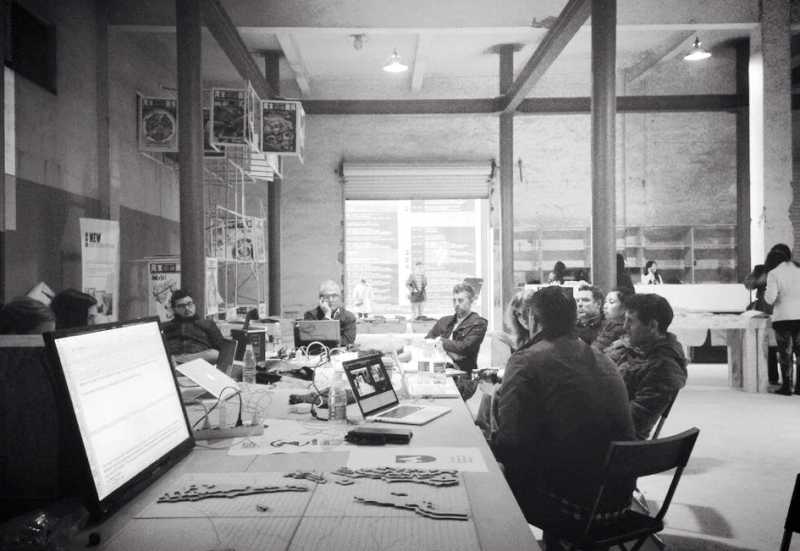
LAB in Shenzhen
URBAN DELTAS IN TRANSITION
In the context of the eponymous presentation of eight urban delta regions in the IABR–2014– main exhibition, scientists and designers will address the existing threats and opportunities in various delta regions. Their aim is to realize an exchange of knowledge in the field of measures and spatial strategies: knowledge that can help link the indispensable long-term development of delta water systems facing climate change to short-term plans for urban and nature development.
At the symposium, hosted by Urbanism TU Delft, new theoretical insights and (related) new design concepts and spatial strategies will be presented and discussed.
Program
09:00 Registration and coffee
09:30 Welcome and introduction, Han Meyer, TU Delft
Sessie I: Understanding deltas in transition
10:00 Steffen Nijhuis, TU Delft
10:30 Richard Campanella, Tulane University, New Orleans
11:00 Break
Sessie II: Designing deltas in transition
11:15 Frits Palmboom, TU Delft
11:45 Diego Sepulveda Carmona, TU Delft, Wolbert van Dijk, Rotterdam
12:15 Tom Colbert, University of Houston
13:00 Lunch
13:45 Joao Pedro Costa, University of Lisbon
14:30 Bruno De Meulder, Catholic University of Leuven
15:15 Break
Sessie III Discussion
15:30 Reflections, Peter Bosselmann, University of California, Berkeley, Bas Jonkman, TU Delft
16:00 Debate
17:00 Closure and Drinks
language: English
for more information please visit www.tudelft.nl
free admission, please sign up via l.h.i.devos@tudelft.nl
TESTED ON TEXEL
The meeting Tested on Texel presents innovative projects that demonstrate how developments and changes concerning climate, energy, agriculture, and tourism can be used as development opportunities. The results of the IABR–Project Atelier Planet Texel, which involved many entrepreneurs, social organizations, and inhabitants of Texel, offer concrete suggestions for the mutual enhancement of environmental sustainability and island economics – suggestions that may also be relevant to other islands, (touristic) regions, and cities at home and abroad.
The meeting will address and share the experiences and insights and will look forward towards the next steps: how can the projects presented be implemented? Which are the key stakeholders in this next step? And what are their opinions on the results presented?
For a small preview watch the video Planet Texel
language: Dutch
free admission, please sign up via iabr@texel.nl
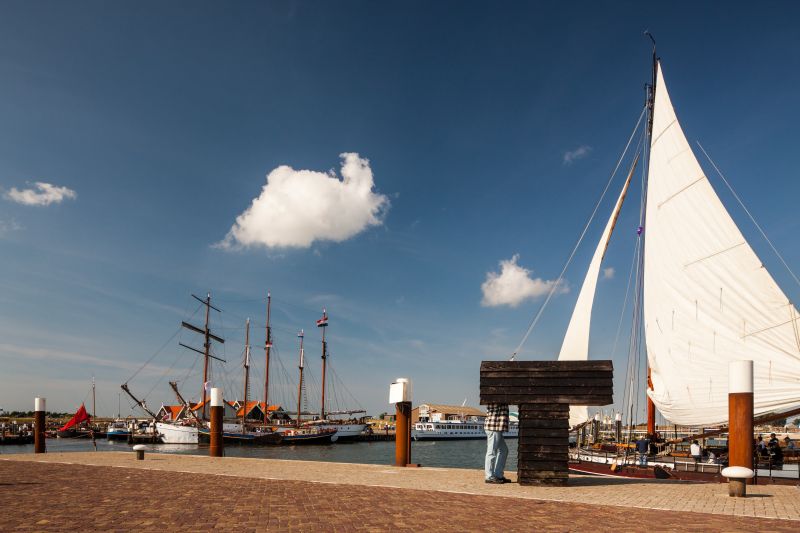
Hans Peter Föllmi
Let us take you down into Rotterdam’s underground. Meet the unknown, dark side of the city and hear the stories from the operators of public works themselves.
On Saturday, June 14, you can join an expedition into the depths of the Maastunnel and get acquainted with the control room, ground tunnel and the fans hall. The expedition will then take you to the underground water storage (OWB) of the Museumpark. This water retention facility can store up to 10.000 m³, representing half of the storage capacity of the sewer system in the center of Rotterdam.
Hint: Conclude your tour with a visit to the Kunsthal Rotterdam, where the underground has its very own gallery in the exhibition URBAN BY NATURE–
The expedition starts at the Maastunnel, the route will be continued on foot.
Group 1: 10 a.m. – 12 p.m.
Group 2: 11.30 a.m. – 1.30 p.m.
Group 1 meets at the Maastunnel no later than 10 a.m. Address: Parkkade 30 - Escalators Building North (just past the Euromast, in the direction of the Nieuwe Maas)
Group 2 meets at the Maastunnel no later dan 11.30 a.m. Address: Parkkade 30 - Escalators Building North (just past the Euromast, in the direction of the Nieuwe Maas)
Not suitable for children under 12 years and those with physical limitations.
Language: Group 1 Dutch
Language: Group 2 English
Admission is free, registration required at: beheerondergrondgw@rotterdam.nl
Please indicate the date and group number at your registration.
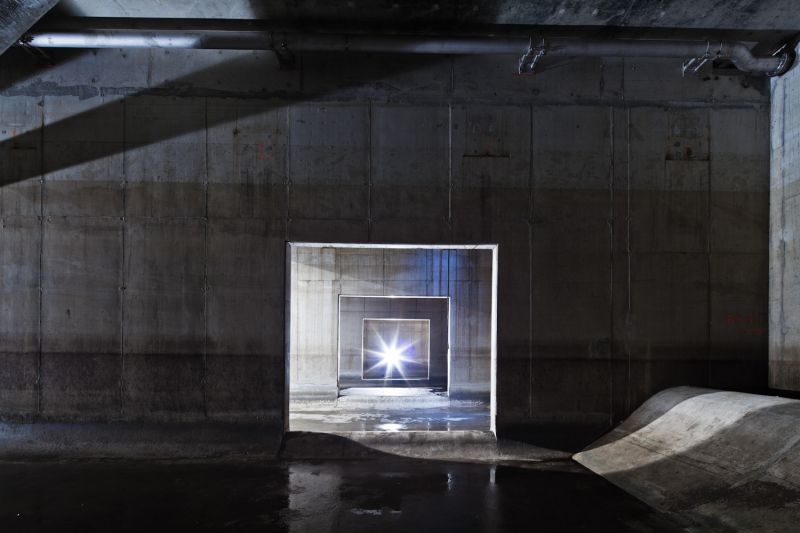
© Jannes Linders
When it comes to the urban metabolism there is already a lot on show on the streets of Rotterdam: pilots, showcases, and projects are innovative examples of the way the city deals with the different flows addressed in the IABR–PROJECT ATELIER ROTTERDAM: Urban Metabolism.
A map produced by the Municipality of Rotterdam shows how the urban metabolism is visible in the Rotterdam area. On 14 June and 28 June, you can join a guided tour through the city. Rotterdam's Material Flows takes you to familiar and less familiar locations in the city portraying how Rotterdam deals with food, water and waste. From cultivating mushrooms to water collection in a car park and from green facades to picking gardens!
Starting times: 11 a.m. and 2 p.m.
Price: 5 euro
Language: Dutch
Please register at: reserveren@rotterdam-archiguides.nl
The 1,000 m2 DakAkker (RoofGarden) on top of the Schieblock office building in the center of Rotterdam is Europe’s first major urban agricultural rooftop garden. During both the Hidden Gardens Weekend and the Day of Architecture, the DakAkker on Schieblock is open to the public throughout the day. Ask the rooftop farmer all about rooftop agriculture and enjoy cups of rooftop tea in the pop-up teahouse.
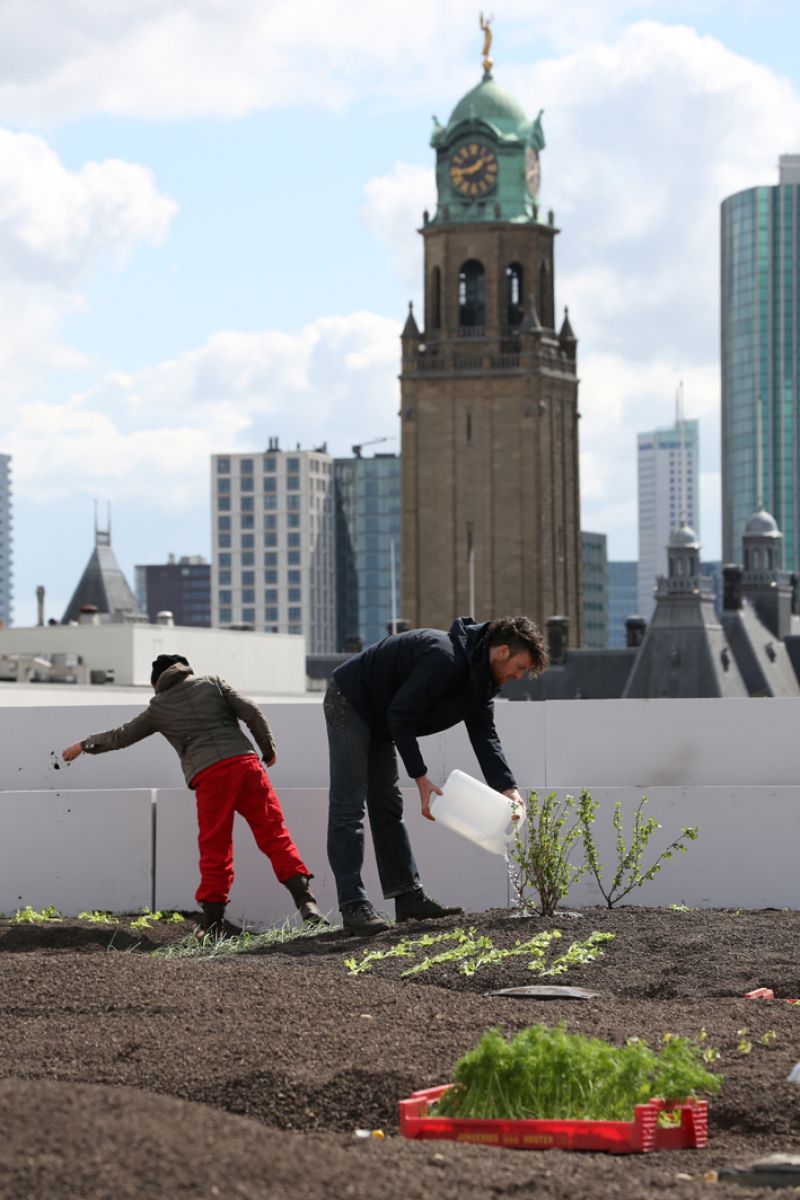
picture: Ossip van Duivenbode
The 1,000 m2 DakAkker (RoofGarden) on top of the Schieblock office building in the center of Rotterdam is Europe’s first major urban agricultural rooftop garden. During both the Hidden Gardens Weekend and the Day of Architecture, the DakAkker on Schieblock is open to the public throughout the day. Ask the rooftop farmer all about rooftop agriculture and enjoy cups of rooftop tea in the pop-up teahouse.

picture: Ossip van Duivenbode
PORT NATURE
Fen orchid, natterjack toad, and other red-list species have made their permanent home in the Rotterdam port area, just like Europe’s largest colony of black-backed gulls. This field trip is meant for visitors who enjoy seeing the port’s nature up close, accompanied by an ecologist of the BSR (Urban Nature Bureau).
language: Dutch
for more information please visit www.portofrotterdam.com
tickets can be purchased at the Kunsthal checkout counter. As there is only a limited number of seats, we highly recommend that you register via the registration form.
CRY OF THE GODWIT
An audiovisual live performance by Theunis Piersma, professor Migratory Bird Ecology and Sytze Pruiksma, composer, sound artist and bird-watcher.
language: Dutch
free admission, no registration required
FEEDING METROPOLES
Urbanization is still expanding rapidly, and it makes feeding the populations of the world’s metropolitan regions a major challenge. Connecting the principles of urban populations to the productive capacities of agribusiness uncovers new strategies. The invited speakers will address the current situation and explore the way forward.
language: Dutch
free admission, please sign up via www.metropolitanagriculture.com
BRABANTSTAD
How can the strengths and qualities of the Brabant Mosaic Metropolis be optimized to realize its ambition to become and remain a top knowledge and innovation region? And how can that be done in concurrence with current principles about the appropriation of social energy?
On BrabantStad+ Day, these and other questions will be discussed. The focus will be on the results of research by design performed in the context of the IABR–Project Atelier BrabantStad.
BrabantStad+ Day is the next step in Braband(Stad)’s participation in the IABR, and brings it closer to achieving its goal of developing new approach methods and policy, and advancing the debate on the future of Brabant(Stad).
language: Dutch
free admission, please sign up via ywijns@brabant.nl
BUILDING WITH NATURE
How can water-related infrastructures in densely populated deltas be developed in harmony with the environment while making use of nature’s forces and creating new opportunities for nature?
Starting from a number of pilot projects in the Netherlands and abroad, EcoShape, a network of Dutch contractors, consultants, government institutions, applied research institutes, and universities involved in hydraulic engineering and environmental management, wants to discuss these and related issues on the platform of IABR–2014–.
language: Dutch
free admission, please sign up via info@ecoshape.nl
GLOBAL CHALLENGES – URBAN FUTURES
Cities the world over will run into trouble if they do not get a grip on their own metabolism. Flows of energy, food, water, material, and waste are growing fast. On the platform of IABR–2014–URBAN BY NATURE, the PBL Netherlands Environmental Assessment Agency is staging an international debate on the global challenges that cities face.
Participants are Mark Swilling (Stellenbosch University, UNEP IRP), Philipp Rode (London School of Economics), Joyeeta Gupta (University of Amsterdam) and John Urry (Lancaster University).
The afternoon will be moderated by Maarten Hajer (PBL).
language: English
free admission, please sign up via www.pbl.nl/iabr
The book 'Smart about Cities - visualizing the challenges for 21st century urbanism', by Maarten Hajer and Ton Dassen (PBL), will be presented at the this conference.
The book is available at a reduced prize during the IABR (until Augustus 24, 2014): €19,50 in stead of €24,50. Please order your copy here.
REFLECTING on EDUCATION of LANDSCAPE ARCHITECTURE 2014
The theme of the IABR–2014– and international observations on the profession of landscape architecture will serve as a mirror to the five Dutch Schools of Landscape Architecture in order to reflect on their programs, find overlaps, differences, and oppositions, and to present their visions and ideas on education.
language: English
free admission, please sign up via www.dutchschooloflandscapearchitecture.nl
reflection on Urban Rural Interaction
For a thousand years, the city of Groningen (200.000), has occupied a strategic position at the end of the Hondsrug. Down through the centuries, the city and countryside have had to rely heavily on one another. In this framework, the city and countryside are continuously rediscovering themselves: as a laboratory where spontaneous innovation continuously occurs.
The Groningen contribution to IABR is the result of a quest to chart this metabolism.
On June 20, during a lunch debate in the Natural History Museum Rotterdam, Dirk Sijmons and other speakers reflect on the position of the Groningen submission to the IABR–2014–URBAN BY NATURE– exhibition.
Speakers:
Roeland van der Schaaf, alderman Spatial Planning Municipality of Groningen
Tjerk Ruimschotel, supervisor Urbanism Municipality of Groningen
Dirk Sijmons, curator IABR–2014–URBAN BY NATURE–
Eric Frijters, architect .FABRIC en lector FUR ( Future Urban Regions)
Yttje Feddes, former Government Advisor on Landscape
start 12 p.m.
Language: Dutch
free admission, please sign up via jeannette.roelofs@groningen.nl quoting name and organization
For more information please visit: www.urbangrolab.nl
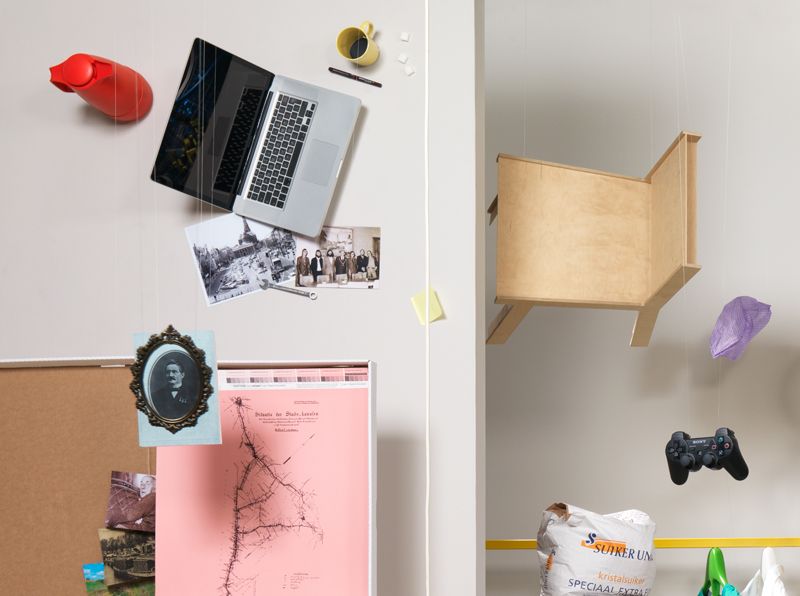
© Shootmedia/VentoBoreale
The 1,000 m2 DakAkker (RoofGarden) on top of the Schieblock office building in the center of Rotterdam is Europe’s first major urban agricultural rooftop garden. During both the Hidden Gardens Weekend and the Day of Architecture, the DakAkker on Schieblock is open to the public throughout the day. Ask the rooftop farmer all about rooftop agriculture and enjoy cups of rooftop tea in the pop-up teahouse.

picture: Ossip van Duivenbode
PORT ARCHITECTURE
This field trip takes visitors to a number of extraordinary locations, areas, and buildings in the 40-km-long port area. En route, an architect of the Port of Rotterdam Quality Team will explain the spatial policy of the Port Authority and its implementation into practice.
Thanks to the "Visual Quality Program', the quality of the visual appearance of the Rotterdam port area keeps increasing. Consider the renovation of typical buildings, Santas and the RDM-site, and the attention to architecture in the construction of new offices, as Euromax, Port City, Dockworks and the building of British Petroleum (BP). Also in the public space, we see beautiful developments on Maasvlakte 2 and the Maxima Viaduct and Dardanellenweg.
Start at 1 pm at the Kunsthal, the excursion ends at 5 pm
language: Dutch
for more information please visit www.portofrotterdam.com
tickets can be purchased at the Kunsthal checkout counter.
price: combiticket IABR exhibition + field trip: 15 euros per person (please note, regarding the closing time of the Kunsthal, the exhibition can only be visited prior to the field trip!)
As there are only a limited number of seats, we highly recommend that you register via the registration form
Let us take you to Rotterdam’s underground. Meet the unknown, dark side of the city and be informed by the operators of public works. On Saturday, June 21, you can wander into the depths of the Maastunnel and take a look at areas like the control room, ground tunnel and the fans hall. The expedition will be continued by a visit to the underground water storage (OWB) of the Museumpark. This water retention can store up to 10.000 m³, representing half of the storage capacity of the sewer in the center. Hint: Conclude your tour with a visit to the Kunsthal Rotterdam, where the underground has its very own chapter in the exhibition URBAN BY NATURE–.
The expedition starts at the Maastunnel, the route will be continued on foot.
Group 1: 10 a.m. – 12 p.m.
Group 2: 1 p.m. – 3.30 p.m
Group 1 meets at the Maastunnel no later than 10 a.m. Address: Parkkade 30 - Escalators Building North (just past the Euromast, in the direction of the Nieuwe Maas)
Group 2 meets at the Maastunnel no later dan 1 p.m. Address: Parkkade 30 - Escalators Building North (just past the Euromast, in the direction of the Nieuwe Maas)
Not suitable for children under 12 year and those with physical limitations.
Language: Dutch (an English expedition is provided on 14 June)
Admission is free, registration required at: beheerondergrondgw@rotterdam.nl
Please indicate the date and group number at your registration.

© Jannes Linders
¿ ? DAKENNIE ¿ ?
Children’s activities on the DakAkker Rotterdam – discover urban agriculture on top of the Schieblock and be a real rooftop farmer for an afternoon.
Dakennie = searching, browsing, planting, weeding, harvesting, seeding, seed bomb making, and building a scarecrow or a bee hotel under the supervision of rooftop farmers.
please register via info@milieucentrum.rotterdam.nl
Director of the Youth Food Movement Joris Lohman tells about the relationship between nature and our food, and what actions and interventions are needed in the transition to a food system with respect for nature, humans, animals and the environment.
Throughout the world, more and more young people are increasingly aware of the role they can play in the transition to a more sustainable and healthier food culture. An important representative is the Youth Food Movement; part of the international Slow Food Youth Network. They are active since 2009 with the YFM Academy, actions and the annual Food Film Festival, and they are working on a chain-wide network of change-minded young professionals in agro and food.
Programma:
15.00 – 15.30 Reception with coffee and tea
15.30 – 15.40 Welcome by Natasja Oerlemans
Hoofd Footprint & Innovatie bij het Wereld Natuur Fonds
15.40 – 16.30 Lecture 'Nature on your plate' by Joris Lohman
16.30 – 17.00 Drinks with YFM approved snacks
language: Dutch
free admission, no registration required
For more information about the YFM please visit the website.
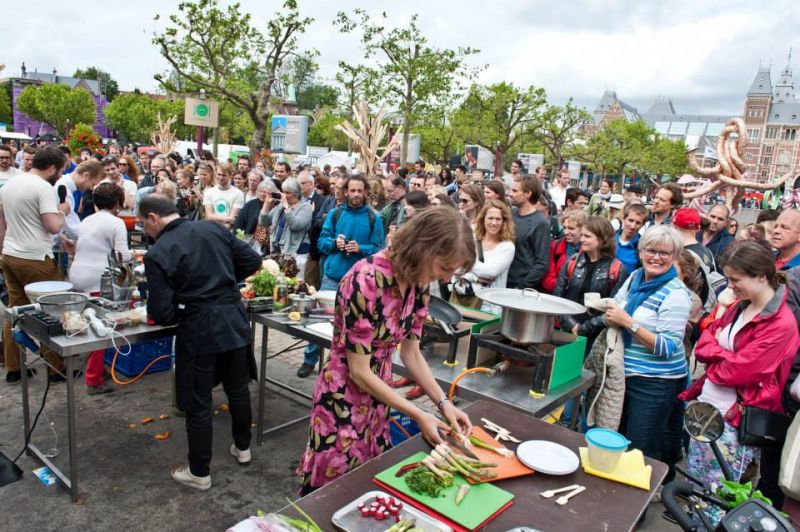
In The Diversity of Vacancy, the morning session of the conference on Vacancy and Reallocation, various parties will extensively discuss the diversity among unoccupied buildings.
organized by: Board of Government Advisors and the Netherlands Environmental Assessment Agency with the cooperation of Rudy Stroink, RAAAF, SCP, PBL, o.l.v. Ruben Maes
language: Dutch
for more information please visit www.collegevanrijksadviseurs.nl
free admission, please sign up via bram.verhave@rgd.minbzk.nl
What will happen when, rather than reallocating buildings, we reallocate regions, in connection with other challenges in the area?
This debate addresses the research by design into potential strategies for the deployment of the opportunities concordant with reallocation for the creation of a regional spatial and economic agenda.
organized by: Atelier Making Projects, National Real Estate and Development Office, National Office of Cultural Heritage, Ministry of Infrastructure and the Environment, Ministry of the Interior and Kingdom Relations, Creative Industries Fund NL, CRA-Board of Government Advisors
language: Dutch
free admission, please sign up via ateliermakingprojects@minienm.nl
TINKERING WITH MATERIAL FLOWS
URBAN DEVELOPMENT ROTTERDAM AND THE CIRCULAR ECONOMY
PROJECT ATELIER ROTTERDAM is the next step towards Rotterdam’s goal to become a sustainable city and region. The results are in: the research by design, the developed strategies, and the concrete project proposals provide a solid starting point for sustainable urban development in Rotterdam, based on an extensive analysis of its metabolism and that of the Rhine-Meuse-Scheldt Delta in which the port city is a node.
On 25 June, the city of Rotterdam in collaboration with the IABR and AIR will start looking for the connection and synergy between these proposals, and for the major Rotterdam players and the local small-scale initiatives that are the building blocks of a successful circular economy. Take part in the open discussion and help think about the city and its future.
language: Dutch
free admission, for more information and program, please visit www.sleutelenaanstofstromen.nl
for more information on the IABR–Project Atelier Rotterdam please continue reading here
FUTURE METROPOLIS
On 27 June 2014, knowledge and innovation network CLICKNL | Built Environment, part of the Top Sector Creative Industries, kicks off with the event ‘Future Metropolis’. The event takes place during IABR–2014–URBAN BY NATURE–. Designing the flows of people, material and energy in the city is discussed in four sub-themes: shopping, living, energy and transit.
The kick-off is organized for all players in the sector ‘built environment’: knowledge, government, and market parties. CLICK NL | Built Environment characteristically stimulates crossovers to achieve innovation in the built environment. Inspiration and collaboration are the main themes of the opening event.
INSPIRATION – Winy Maas kicks off with his views on the theme ‘Future Metropolis’. Shopping, Living , Energy, and Transit are the building blocks of a new city, a metropolis that through research , innovation, and smart coalitions can develop into a real ‘smart environment.’ At breakneck speed, designers, researchers, and stakeholders present ‘inspiring practices’ in the field of innovation in the urban built environment.
COOPERATION – The theme of the second part of the program is the connecting of existing networks. Designers, governments and research institutions seeking crossovers / partners for their innovative project or idea for the ‘future metropolis’ can make a pitch during the speed dating market. Please join in and register!
Closing with networking over drinks.
Language: Dutch
Free admission, please register here
For more information, please visit: www.click.nl
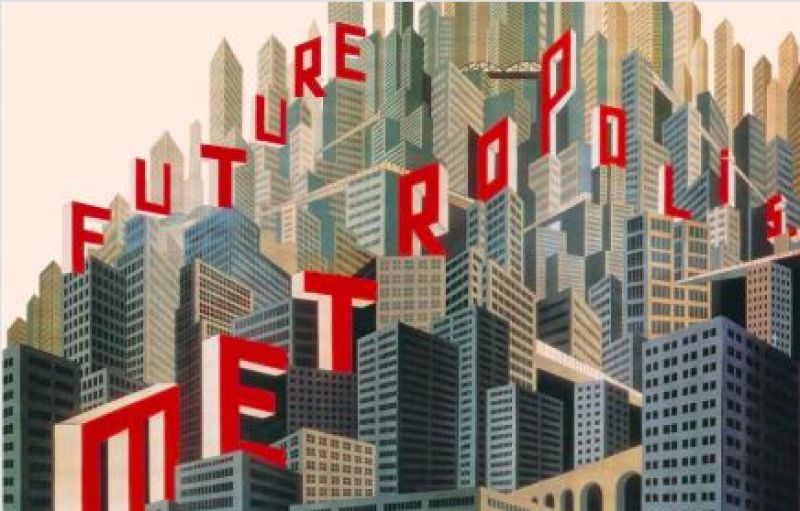
Expedition Underground 3
Bascule Basement Erasmus Bridge, Westersingel Pumping Station and OWB Museumpark
Let us take you to Rotterdam’s underground. Meet the unknown, dark side of the city and be informed by the operators of public works. On Saturday June 28, you can wander into the underground water storage (OWB) of the Museumpark. This water retention can store up to 10.000 m³, representing half of the storage capacity of the sewer in the center. The expedition will be continued by a visit to the Westersingel Pumping Station. The pump capacity of this monumental building was increased and connected to the new underground waterstorage under the Museumpark Garage during the renovation in 2010-2011. The expedition ends with a very unique opportunity to visit the Bascule Basement of the Erasmus Bridge. The movable part of the Erasmus bridge is designed as a single bascule bridge, the largest and heaviest of Western Europe. Hint: Conclude your tour with a visit to the Kunsthal Rotterdam, where the underground has its very own chapter in the exhibition URBAN BY NATURE–
The expedition starts at the Museumpark Garage, the route will be continued on foot.
Group 1: 10 am – 12.30 pm
Group 2: 1 am – 3.30 pm
Group 1 meets at the car entrance to the Museum Park Garage (Museum Park 32), no later than 10 a.m.
Group 2 meets at the car entrance to the Museum Park Garage (Museum Park 32), no later than 1 p.m.
Not suitable for children under 12 years and those with physical limitations.
Language: Dutch (an English expedition is provided on 14 June)
Admission is free, registration required at: beheerondergrondgw@rotterdam.nl
Please indicate the date and group number at your registration.

© Jannes Linders
When it comes to the urban metabolism there is already a lot on show on the streets of Rotterdam: pilots, showcases, and projects are innovative examples of the way the city deals with the different flows addressed in the IABR–PROJECT ATELIER ROTTERDAM: Urban Metabolism.
A map produced by the Municipality of Rotterdam shows how the urban metabolism is visible in the Rotterdam area. On 14 June and 28 June, you can join a guided tour through the city. Rotterdam's Material Flows takes you to familiar and less familiar locations in the city portraying how Rotterdam deals with food, water and waste. From cultivating mushrooms to water collection in a car park and from green facades to picking gardens!
Please register at: reserveren@rotterdam-archiguides.nl
¿?DAKENNIE¿?
Children’s activities on the DakAkker Rotterdam – discover urban agriculture on top of the Schieblock and be a real rooftop farmer for an afternoon.
Dakennie = searching, browsing, planting, weeding, harvesting, seeding, seed bomb making, and building a scarecrow or a bee hotel under the supervision of rooftop farmers.
please register via info@milieucentrum.rotterdam.nl
A mini-symposium about integrating greenery into urban environments, with the DakAkker on the Schieblock (IABR Test Site Rotterdam) and other inspiring projects from around the world serving as examples.
Speakers:
Luc Smits director LSI (owner Schieblock)
Henk Vlijm director Optigreen Benelux
Dr. Cristoph Maria Ravesloot Rotterdam University
Kristan Skaarup GRO, Kopenhagen
Jo Huygh SA Abattoir, Brussels
Workshop round 1:
1. Dakakker, construction and management: Wouter Bauman (RMC) en Rob Luyk (Binder daktuinen) – Dutch
2. Abattoir in Brussel: Jo Huygh (plan rooftopfarm on the Abbottoir in Brussels) – Dutch
3. GRO Kopenhagen: Kristan Sjaarup (rooftopfarm Gro Kopenhagen) – English
4. Why Green Rooftops and Financing: Dr. Cristoph Maria Ravesloot en Eveline Bronsdijk (gemeente Rotterdam) – English
Workshop round 2:
1. Valuefarms: Thomas Chung (Hong Kong) – English
2. Rooftop-education: Angelique Vandevenne – English
3. Botanical Garden on the Roof: Gert Jan Koopman (stichting Heem) – Dutch
4. Why Green Rooftops and Financing: Dr. Cristoph Maria Ravesloot en Eveline Bronsdijk (gemeente Rotterdam) – English
Organized by: Rotterdam Environmental Centre in collaboration with OptigroenNL, Binder Green Projects, Rotterdam Environmental Centre
lunch at noon at the Dakakker (kosten 15 euro)
program starts at 1 p.m. in BAR
language: Dutch / English
please register via info@milieucentrum.rotterdam.nl
for more information, please visit www.milieucentrum.rotterdam.nl
On the 4th of July, these perspectives will form the basis for exciting presentations, discussions and hefty debates on the future of spatial planning.
Why are business areas still being built? When will the bike, as the future means of transport, be given priority in the city? When will the office market bubble burst? Can provinces play a role in stimulating the labour market? Is it just to build in the Delta? On this day, we want to raise the questions that have not yet been asked, and to highlight the problems that we have tried to dodge. Friday, 4th of July, 12:30 in the Kunsthal Rotterdam. Free entry, register now!
Program:
12.30 Reception / registration
13.00 Opening & key note address – Peter Heij
13.05 Introduction Year of Spatial Planning – Hans Leeflang
13.15 The five perspectives – Paul Gerretsen
13.35 New types of work in Spatial Planning – Rick Vermeulen
13.45 Break – formation of table groups
14.00 – 15.30 Breakout sessions
Six tables: The Netherlands as ‘Production land’; Green Blue Netherlands; The Netherlands as ‘Sustainable land’; The Netherlands: One big city; The Netherlands as ‘Network land’; Free table.
15.30 Break – back to the Auditorium
15.45 Each table reports on their insights
16.30 Presentation of the Year of Spatial Planning website & close – Jeroen Niemans
16.35 Close – Hans Leeflang
16.45 – 17.30 Drinks
Organized by: Platform31 (on behalf of C2015 and the Ministry of Infrastructure and the Environment) and Deltametropool
language: Dutch
free admission, please sign up via www.platform31.nl (registration required)
POD PEANUT PLATFORM
During the IABR–2014–URBAN BY NATURE, at the first pod peanut platform, the connection between nature and architecture will be investigated and unravelled on the basis of two narratives: ‘Architecture Follows Nature’ and ‘Nature Meets Architecture’.
Ilaria Mazzoleni (IMStudios, Milan/Los Angeles) addresses the first theme. In her book, recently published, Architecture Follows Nature: Biomimetic Principles for Innovative Design (CRC Press), innovative solutions are found for building envelopes by the imitation of tactics from the animal kingdom (biomimesis).
Huib van Zeijl en Daniëlle Segers (Équipe architects, Amsterdam) address the theme ‘Nature Meets Architecture’. Their extension for the Helvoirt Groenprojecten ‘Proyecto Roble’ has been, amongst others, winner of the BNA Building of the Year Award (2013) as well as the ARC12 Price of Architecture (2012). A very special and sustainable project, embedded in the environmental context and built in an innovative collaboration. ‘Green’ (ecological) energy is generated locally, and during the entire project, and lots of thinking has gone into how to dismantable buildings and accountably use materials. Artifical light is practically redundant and the bio-rhythm of people is the central issue.
Manou Huijbregts (HP architecten, Rotterdam) will be the moderator.
language: English
entrance is free, please sign up via www.pelpindapodium.nl
Location:
Erasmus Centre for Entrepeurship
Rotterdam Science Tower (number IV)
Marconistraat 16, 11th floor
3029 AK Rotterdam
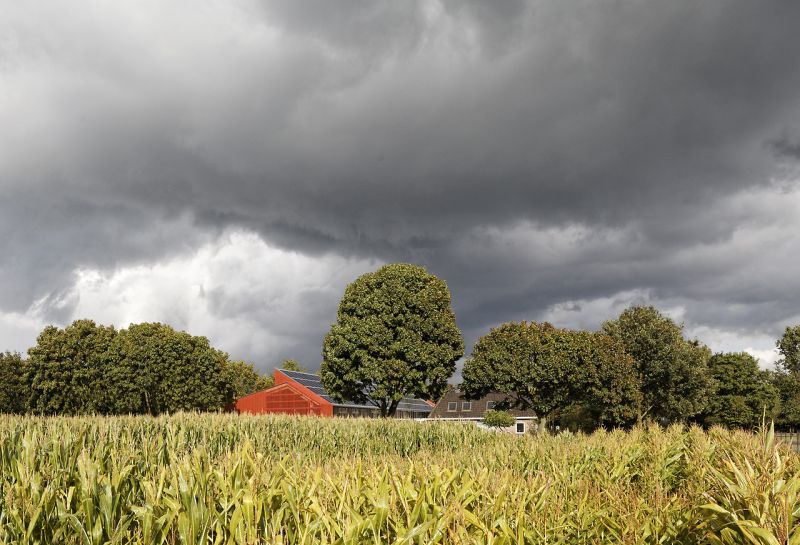
© René de Wit
Maasvlakte 2 and Slufter (2)
Unfortunately this tour is fully booked. There might be cancellations. In that case, you can try to obtain a ticket at the Kunsthal on 6 July.
Reserved tickets can be picked up at the Kunsthal on 6 July, no later than 30 minutes before the start of the tour.
A field trip to the port with an expert explaining the general principles of port development and the principles used to design and construct the Maasvlakte 2. The trip includes a visit to the Slufter, a depot for storage of contaminated dredged material built in the 1980s that is presently the subject of research concerning its future use.
The Maasvlakte 2 and Slufter projects are featured in the exhibition URBAN BY NATURE– in the Kunsthal Rotterdam.
language: Dutch
for more information please visit www.portofrotterdam.com
tickets can be purchased at the Kunsthal checkout counter.
price: combiticket IABR exhibition + field trip: 15 euros per person (please note, regarding the closing time of the Kunsthal, the exhibition can only be visited prior to the field trip!)
Wildpark Rotterdam
A lecture by Jelle Reumer, followed by a guided tour of the IABR–2014–URBAN BY NATURE– exhibit ‘PURE RESILIENCE – the city is a wildlife habitat’ in the Natural History Museum Rotterdam.
Jelle Reumer's new book, Wildlife in Rotterdam – Nature in the City, is a small history of urban ecology and an ode to the resilience of nature. With gusto Jelle Reumer speculates about urban nature in the future and signposts the astonishing evolutions taking place every day under our urbanized noses. Tomatoes sprouting from tramlines, swans building nests of plastic bottles, subway mosquitoes that never leave their underground lair: the city is a miraculous cradle of wildlife.
language: Dutch
please register via zondagmiddag@hetnatuurhistorisch.nl
for more information visit www.hetnatuurhistorisch.nl
The book Wildlife in Rotterdam – Nature in the City is for sale at the Kunsthal Bookshop or online at www.historischeuitgeverij.nl
ROOM FOR RENEWABLE ENERGY IN 2050
What is the impact of the transition to 100 per cent renewable energy by 2050? A discussion and a double book launch. Commissioned by the CRA, a photographic baseline by Theo Baart, presents the current state of affairs in the Netherlands. Government Advisor Eric Lutes explain his recent opinion on wind turbines. And then, the book kWh/m2: Landscape and Energy. An initiative of IABR–2014–URBAN BY NATURE– curator Dirk Sijmons and H+N+S Landscape Architects, published by NAi/010. This book contains the results of design research on the spatial implications of an almost 100% energy transition in 2050 at four levels: Europe, the regional landscape, the city and the individual household.
Both books are offered to Ed Nijpels (Chairmen of the Committee 'Secure Energy agreement').The event will be moderated by Jaap Modder.
Organized by: NAi010 Publishers / College van Rijksadviseurs / H+N+S Landschapsarchitecten / Landscape architecture TU Delft
The publication kWh/m2: Landscape and Energy is available at the NAi Bookshop.
time: registration from 3 p.m., start program 3.30 p.m.
language: Dutch
free admission, please sign up via rsvp@nai010.com
THE URBAN UNDERGROUND
THE URBAN UNDERGROUND is a full-day program, which addresses how careful deployment of the subsurface can improve the value of life above ground.
Increasing urbanization throughout the world challenges the sustainable development and resilience of cities. Despite this, the importance of the ground beneath cities is under-recognized and often overlooked. The main goal of THE URBAN UNDERGROUND is to provide a long-needed contribution to greater interaction and networking, and so transform the relationship between experts who develop urban subsurface knowledge and those who can benefit most from it: urban planners, urban decision makers and the community.
The program consists of:
A symposium in which urban developers and underground specialists from various European cities discuss the urgent issues concerning the urban underground.
And an underground experience: 3D models and visualizations, serious game, demo sessions, profiles, cores.
PROGRAM:
09.00 Registration with coffee & tea
PLENARY SESSION 9.30 – 10.40 a.m.
09.30 Welcome and Introduction by the Chairman (Ard den Outer)
09.40 Opening by ir. Ron Voskuilen (Director City Development City of Rotterdam)
09.50 Need for efficiënt use of urban subsurface resources- Prof. Dr. Jacqueline Cramer (Professor of Sustainable Innovation at Utrecht University, ambassasor of COB)
10.15 The world between Cables and Carboniferous - Dr. Michiel van der Meulen (TNO Geological Survey)
BREAK 10.40 - 11.00 a.m.
PARALLEL SESSIONS 11 - 12.30 a.m.
Session 1: Workshop Ministry of Infrastructure and the Environment with Helsinki (Natural History Museum),
Session 2: Presentations (Auditorium Kunsthal),
Session 3: 3D Demo’s (LAB Kunsthal),
Session 4: Serious Game Underground (Auditorium Upstairs)
LUNCH 12.30 - 1.45 p.m.
PARALLEL SESSIONS 1.45 - 3.15 p.m.
Session 1: Workshop Ministry of Infrastructure and the Environment with Oslo (Natural History Museum),
Session 2: Presentations (Auditorium Kunsthal),
Session 3: 3D Demo’s (LAB Kunsthal),
Session 4: Serious Game Underground (Auditorium Upstairs)
BREAK 3.15 - 3.40 p.m.
PLENARY SESSION 3.40 - 4.30
15.40 Feedback from parallel sessions
15.55 COST–SUB-URBAN: Improving the understanding and use of the ground beneath of our cities Dr. Diarmad Campbell (British Geological Survey)
16.20 Closing Remarks by ir. Johan Vermeer (Director Engineering Consultants City of Rotterdam)
16.30 Close by the Chairman & Drinks
Organized by COST-SUBURBAN; City of Rotterdam, Engineering MRO; TNO Geological Survey; COB; Strategis; RO2.
With the participation of: Ministry of I&M (STRONG), Ministry Economical affairs (EBN), City of Amsterdam and Geo-Impuls.
Language: English
Admission is free, please register via connecting_underground@rotterdam.nl
Harvesting nutrients in Rotterdam
Rotterdam is a ‘vegetable garden’ full of valuable nutrients, ready to be harvested. In and around the city of Rotterdam approximately 1.2 million people produce a large waste stream. Especially large-scale events, big scale office buildings and a plentitude of restaurants cause large amounts of renewable resources to disappear. On the other hand, there is a considerable potential demand for these resources in greenhouses in the Westland, for urban agriculture in Rotterdam and for the parks and gardens of several municipalities. By linking the two we can make a major contribution to the circular economy.
In the context of IABR–2014–URBAN BY NATURE, an international urban agriculture expert will share his experiences in Rotterdam, and we will start conversations on the theme of nutrient recycling in cities and surroundings.
Afternoon program 1 to 5 p.m.
Circular Clinics
location: Municipality of Rotterdam: Galvaninstraat 15, Rotterdam
Clinics for businesses, educational institutions, NGOs and public organizations: conversation about and prioritizing of the potential for recycling of nutrients in Rotterdam.
Evening program 7 - 10 p.m.:
‘Stadslandbouwcafe' (Urban Agriculture Café)
location: Fenix Food Factory: Veerlaan 19, Rotterdam
Interactive program for citizens, urban agriculture businesses and organizations. Looking for possible contributions of nutrient recycling to urban agriculture and local entrepreneurship.
Both events are free of charge
Language: English
For more information, the full program and the register form, please visit www.growthecity.eu
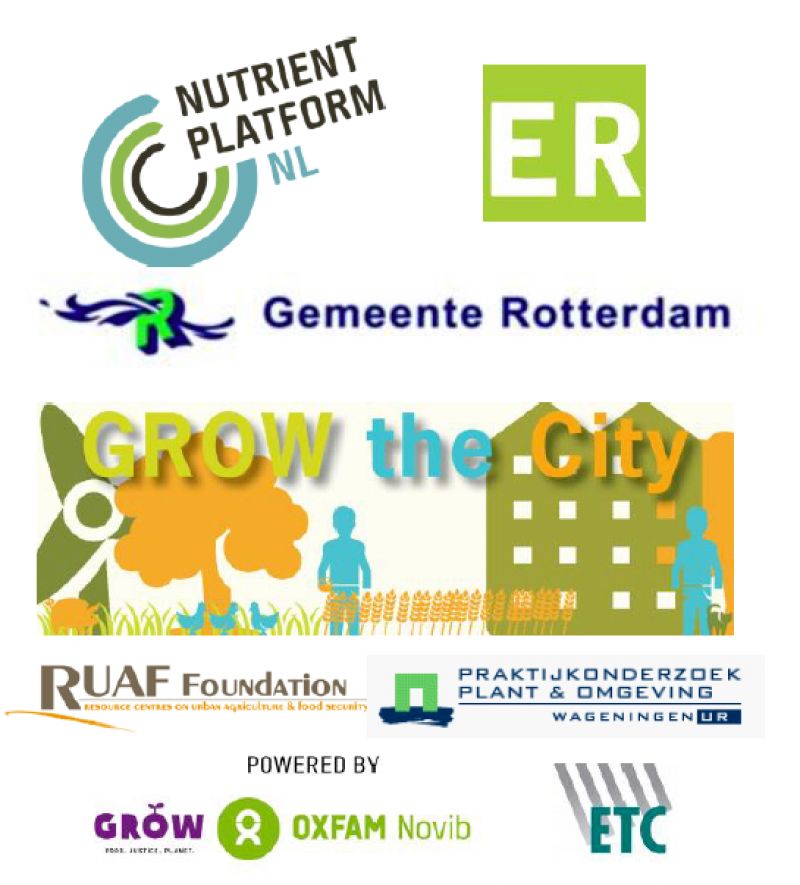
WEED PICKING
We are Urban by Nature, and so we go cycling through Rotterdam to find the delicious wild foods that can be found in the city.
The Youth Food Movement outlines a route that starts at Station Blaak and takes you past places to find unexpected edible plants and flowers.
The search ends at the beautiful location of Hof van Noord, where we will view and prepare our city harvest to finally eat it together.
The tour starts at 1 p.m.
meeting place: Station Blaak
participation is free, please register via rotterdam@youthfoodmovement.nl
language: Dutch
For more info please visite Facebook
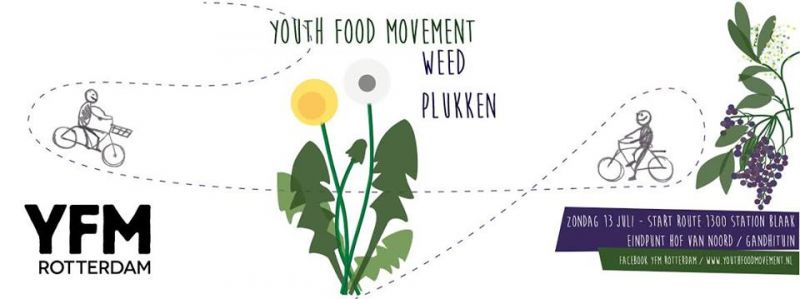
Rotterdam's material flows 3
Rotterdam is the city that both the New York Times and the Rough Guides have proclaimed the must-see city of 2014.
For the second year in a row, Rotterdam Info opens the temporary travel agency Staycation that gives residents and tourists expert advice on what to do when on holiday in Rotterdam.
Staycation opens its doors on Saturday, July 12. During the opening weekend everyone can participate in a guided bicycle tour of Rotterdam's Material Flows. This tour, organized in the context of IABR–2014–URBAN BY NATURE–, demonstrates the metabolism of Rotterdam and shows how Rotterdam deals with food, water and waste. The tour starts at 1 p.m. at Rotterdam Info Coolsingel and ends at 3.30 p.m.
Price € 5,00 p.p.
Duration 2,5 hours
Start: Rotterdam Info Coolsingel, Coolsingel 195-197
Language: Dutch
For more information and registration go to www.rotterdam-archiguides.nl
Note: Do bring your own bike!
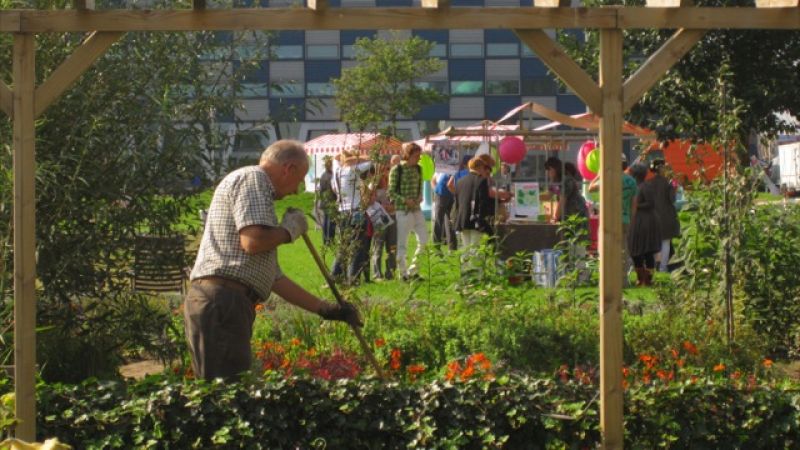
PURE RESILIENCE
gardens: physically and socially connected urban nature
The research of Ellen van Holstein – PhD candidate at the University of Wollongong, Australia – focuses on community gardens. Following an Urban Political Ecology approach she asks how community gardens can be understood as a coming together of social relations and practices and who gets to decide on how these shared garden spaces work. Community gardens are imagined as spaces that provide greenery and access to food, that empower citizens, that mitigate the negative impacts of urbanization, and that are therefore increasingly made part of policies to 'green the city'. Drawing on case studies in Sydney, Australia, Van Holstein argues that community gardens are not always spaces that are empowering and inclusive to all. Now that community gardens are presented as quick fixes to challenges of urban sustainability and social equity, it becomes increasingly important to understand power relations in gardens and who gets left out.
During this meeting Ellen van Holstein presents her research followed by a Q&A and discussion moderated by Jelle Reumer, director of The Natural History Museum and author of the book 'Wildlife in Rotterdam'.
time: 5 – 6 p.m.
location: Natural History Museum
language: English
For more information please visit www.hetnatuurhistorisch.nl
EXPEDITION UNDERGROUND
Let us take you to Rotterdam’s underground. Meet the unknown, dark side of the city and be informed by the operators of public works. On Saturday, August 2, you can wander into the depths of the Maastunnel and take a look at areas like the control room, ground tunnel and the fans hall. The expedition starts at the Maastunnel, the route will be continued on foot. Conclude your tour with a visit to the Kunsthal Rotterdam, where the underground has its very own chapter in the exhibition URBAN BY NATURE–.
Group 1: 10 a.m. – 11 p.m.
Group 2: 11.30 a.m. – 12.30 p.m FULLY BOOKED
Group 1 meets at the Maastunnel no later than 10 a.m. Address: Parkkade 30 - Escalators Building North (just past the Euromast, in the direction of the Nieuwe Maas)
Group 2 meets at the Maastunnel no later dan 11.30 p.m. Address: Parkkade 30 - Escalators Building North (just past the Euromast, in the direction of the Nieuwe Maas)
Not suitable for children under 12 year and those with physical limitations.
Language: Dutch
Admission is free, registration required at: beheerondergrondgw@rotterdam.nl
Please indicate the date and group number at your registration.
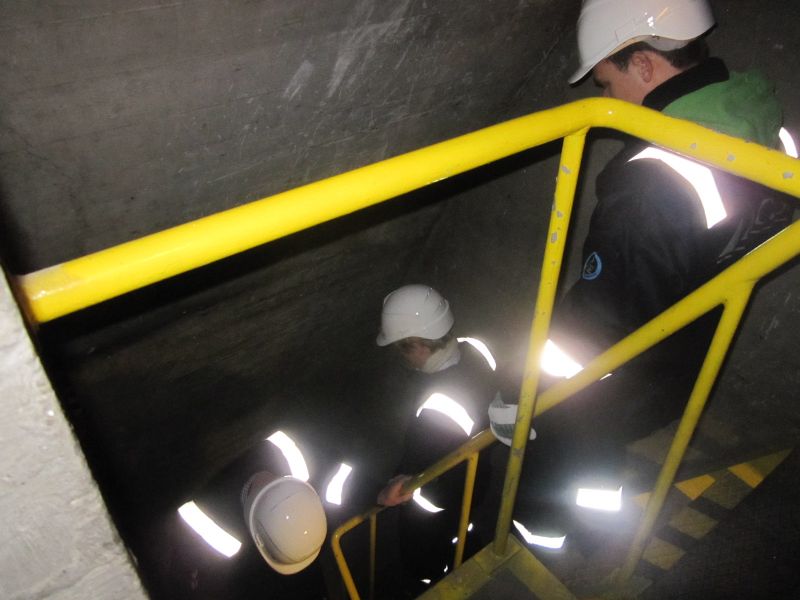
EXPEDITION UNDERGROUND
FULLY BOOKED
Let us take you to Rotterdam’s underground. Meet the unknown, dark side of the city and be informed by the operators of public works. On Saturday, August 23, you can wander into the depths of the Maastunnel and take a look at areas like the control room, ground tunnel and the fans hall. The expedition starts at the Maastunnel, the route will be continued on foot. Conclude your tour with a visit to the Kunsthal Rotterdam, where the underground has its very own chapter in the exhibition URBAN BY NATURE–.
Group 1: 10 a.m. – 11 p.m. FULLY BOOKED
Group 2: 11.30 a.m. – 12.30 p.m FULLY BOOKED
Group 1 meets at the Maastunnel no later than 10 a.m. Address: Parkkade 30 - Escalators Building North (just past the Euromast, in the direction of the Nieuwe Maas)
Group 2 meets at the Maastunnel no later dan 11.30 p.m. Address: Parkkade 30 - Escalators Building North (just past the Euromast, in the direction of the Nieuwe Maas)
Not suitable for children under 12 year and those with physical limitations.
Language: Dutch
Admission is free, registration required at: beheerondergrondgw@rotterdam.nl
Please indicate the date and group number at your registration.

POSTPONED, NEW DATE TO BE DETERMINED soon
The simultaneous opening of Pompenburg Park and the completed Luchtsingel was to take place on Sunday 24 August but is postponed because of the bad weather forecast.
The construction of the wooden bridge started two years ago during the 5th IABR: Making City and its completion would be celebrated in the final weekend of IABR–2014– with an URBAN PICNIC for the whole of Rotterdam in the area surrounding the Luchtsingel.
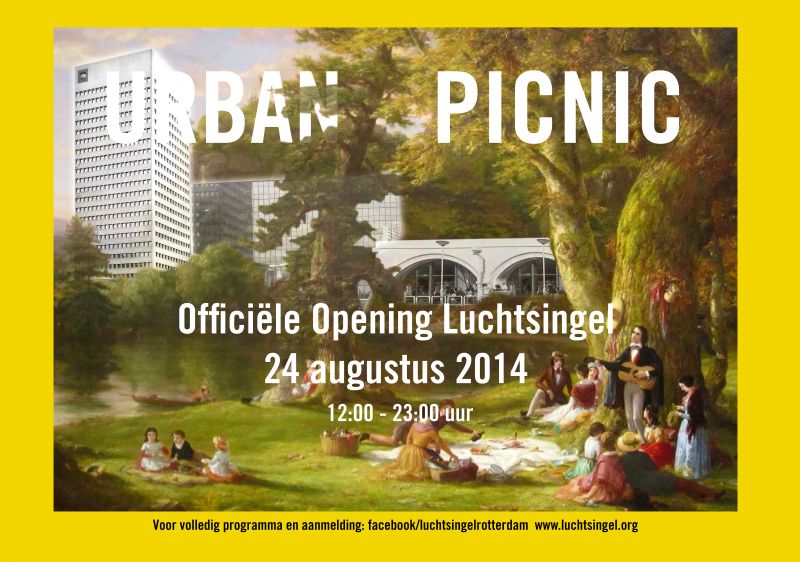
organized by: ZUS in collaboration with IABR
registration via info@luchtsingel.org
Luchtsingel, between Schiekade 189 and Hofplein Station
for more information and a program, please visit www.luchtsingel.org
IABR TEST SITE ROTTERDAM 2012 – 2014
An exhibition of photos by Reineke Otten visualizing the transformation of the Schieblock and Rotterdam Central District over the past two years.
The exhibition opens on Sunday 28 September 2014 at 17.00 hours, and can be visited during the day in the Schieblock Passage of the Luchtsingel.
Planet Texel lands on Texel
On Monday September 29, design offices la4sale and FARO Architects present the final results of the IABR–Project Atelier Planet Texel on the island itself. This presentation marks the start of the next phase of the atelier in which the Municipality of Texel invites local stakeholders and other parties to tangibly contribute to the further development of the project.
That same evening witnesses the kick off of the ‘Planet Texel Academy’ – a direct spin off of the Project Atelier Planet Texel, and an initiative of amongst others the Technical Universities of Eindhoven and Delft. With a focus on De Koog and Nieuweschild, groups of students, supervised by professors and experts, will develop proposals based on the results of Projectatelier Planet Texel.
A selection of the exhibition of Planet Texel that was a section of IABR–2016–'s main exhibition URBAN BY NATURE in Rotterdam, including the "TEXEL T", will be on display.
Monday September 29, from 19u30 to 22u00 in Hotel De Pelikaan, at Pelikaanweg 18, 1796 NR De Koog
In the context of IABR–2014–URBAN BY NATURE–, Project Atelier BrabantStad explored new development models for the Province of Brabant and formulated six development principles.
IABR–Project Atelier BrabantStad now goes on tour. From October 2014 until February 2015, the results of Project Atelier BrabantStad will be exhibited in Eindhoven, Tilburg, Helmond, ‘s-Hertogenbosch and Breda, accompanied by a public program.
More info on the website of MozaïekBrabant → (in Dutch)
Together with the province, the five largest cities, the water boards, Brabant's Architecture Centers, and with an open invitation to the public, everybody is invited to contribute to the program of ‘MozaïekBrabant’ – the next step in the development of the proposals of the IABR–Project Atelier BrabantStad.
From 9 – 31 October 2014, the results of IABR–Project Atelier BrabantStad are exhibited at the Designhuis, Stadhuisplein 3, 5611 EM Eindhoven
Organized by: Province Noord-Brabant, bkkc and Designhuis Eindhoven
From 6 – 30 November 2014, the results are exhibited at the Brabant Knowledge Center for Art and Culture (bkkc), Spoorlaan 21, 5038 CB Tilburg.
Organized by: Province Noord-Brabant and bkkc
From 5 – 31 December 2014, the results are exhibited in Groen4Life & Cacaofabriek at Cacaokade 1, 5705 LA Helmond.
Organized by: Province Noord-Brabant, bkkc, Groen4Life and Cacaofabriek
From 12 – 30 January 2015, the results are exhibited at the Sigarenfabriek Willem II, Boschveldweg 473, 5211 VK ’s-Hertogenbosch
Organized by: Province Noord-Brabant, bkkc and Sigarenfabriek
The last stop, from 5 - 28 February 2015, is at the Stadskantoor of the Municipality of Breda, Claudius Prinsenlaan 10, 4811 DJ, Breda
Organized by: Province Noord-Brabant, bkkc and Municipality of Breda
